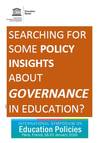Governance, School Leadership and Monitoring and Evaluation as levers for change
The Education 2030 Framework for Action places great emphasis on quality, inclusiveness and equity. While access to education remains high up in the national agenda of many countries, these suggested goals for education in 2030 will require governments to maximize the use of existing policy levers for change.
Full videos of sessions
- Monday 18 January
Session 1 - Session 2 - Breakout Session Room 7 - Breakout Session Room 8 - Breakout Session Room 9 (audio) - Tuesday 19 January
Session 1 - Session 2 - Breakout Session Room 7 - Breakout Session Room 8 - Breakout Session Room 9 (audio) - Wednesday 20 January
Session 1 - Session 2 - Breakout Session Room 7 - Breakout Session Room 8 - Breakout Session Room 9 (audio)
-

Background
-
The Education 2030 Framework for Action places great emphasis on quality, inclusiveness and equity. While access to education remains high up in the national agenda of many countries, these suggested goals for education in 2030 will require governments to maximize the use of existing policy levers for change.
Over the past two years, UNESCO has been closely monitoring three of these levers:
- School Leadership: Head teachers and those who have responsibility at an institutional level in schools are untapped potential which can be used to promote pedagogical change. However, in order to do so a new form of pedagogical leadership is needed;
- Evaluation: The variables and factors that optimize leaning cannot be simply derived from results. Promoting quality necessitates a full system-wide approach to monitoring and evaluation that goes beyond the mere qualification of student learning outcomes;
- Governance: Governance must be reinforced as traditional governmental approaches to education face an increasing number of challenges ranging from privatization to internationalization.
UNESCO International Symposium on Education Policies for 2030: School Leadership, Monitoring and Evaluation and Governance in the implementation of the Education 2030 Framework for Action takes as its broad theme a discussion on which public policies can best help governments to reach higher levels of education quality through the use of governance, school leadership and monitoring and evaluation.
Presentations, panels and debates will be informed by three UNESCO reports featuring the main findings and lessons of the comparative analysis of public policies in these domains carried out over the past biennium and due to be launched at the conference.
-

Overall objectives
-
The Symposium seeks to provide participants from Member States with an opportunity to:
- Learn from Member States’ approaches and strategies to address these challenges in view of the Education 2030 Framework for Action;
- Debate the main findings and policy lessons resulting from the global comparative analyses undertaken by UNESCO over the past two years; and
- Draw the necessary conclusions to guide countries’ policy alignments with the Education 2030 Framework for Action, as well as UNESCO’s role in supporting member states.
Download the final report
- Final report (PDF)
Download the presentations
Download the detailed Programme
- Programme (PDF)




